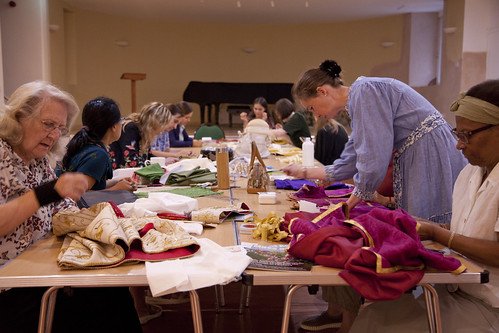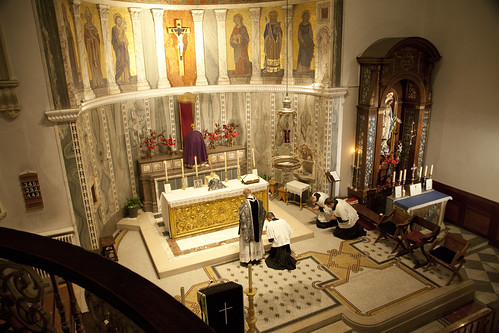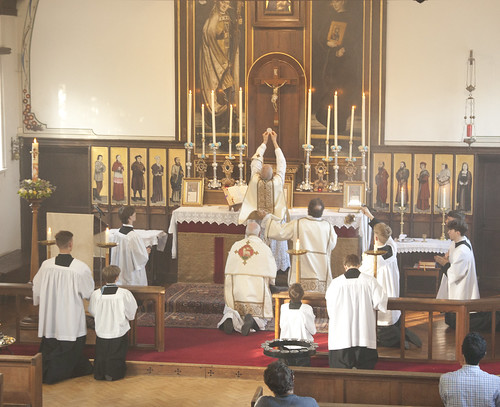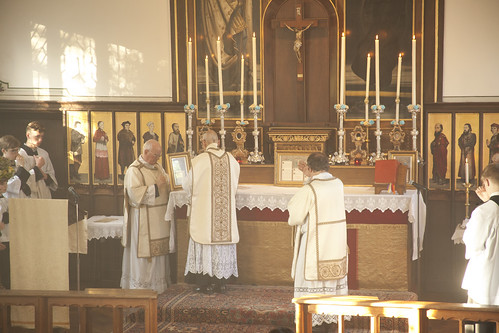Chairman's Blog
Getting men to Mass: for Catholic Answers
 |
| Men outnumber women at the LMS Walsingham Pilgrimage: sign up here! |
In the United States, in England, and across the developed world, women outnumber men in Catholic churches on Sundays. (Figures over time in the USA can be seen here; a worldwide study can be seen here.) The phenomenon got a mention in Pope St John Paul II’s 1988 post-synodal exhortation Christifideles laici 52: “various sectors in the Church must lament the absence or the scarcity of the presence of men.” Despite this, there seems to be much more discussion of the lapsation of women in the Church, and far more concern is expressed about teachings and liturgical practices that might put women off.
Male Catholics might be forgiven for forming the impression that the Church’s hierarchy and commentariat do not, in general, view their disappearance from Mass as very important. Certainly, there are some voices that seem more eager to use the absence of men as an argument for the ordination of women than to do anything to redress the imbalance.
 |
| We also have female-dominated events! Sign up for the next Guild of St Clare Sewing Retreat here, or join us in London this Saturday. |
Corpus Christi Procession in the rain
An Ordinariate for Traditionalists?
 |
| Three priests of the Archdiocese of Westminster take part in a High Mass for Pentecost Monday in Corpus Christi, Maiden Lane, in London. |
In the new edition of the traditionalist journal Sedes Sapientiae readers will find an article by Fr Louis-Marie de Blignières FSVF on the idea of a traditionalist ‘circumscription’, a term covering Personal Ordinariates and Prelatures, and a response to this article by me. Fr de Blignières, for those who don’t know, is the founder and superior of the Society of St Vincent Ferrer, which uses the traditional Dominican Rite. His article promotes the idea of a “circumscription” for Traditionalists: a non-geographical diocese headed by an Ordinary appointed by Rome. I am a bit more sceptical.
Since then an interview with Fr de Blignières has been published on Rorate Caeli on this subject, and I have been encouraged to put my thoughts about it into the public domain as well, to further stimulate what is a very necessary debate. What follows is complementary to my Sedes Sapientiae article.
Dan Hitchens on Sister Clare Crocket: podcast from the Latin Mass Society
 You can listen to Dan's talk on the LMS podcast channel: search for 'Latin Mass Society'
You can listen to Dan's talk on the LMS podcast channel: search for 'Latin Mass Society'
or 'Iota Unum'; here is direct link: https://www.podbean.com/eas/pb-j3pmw-1623f84
Friday 28th June, Sebastian Morello: ‘Cartesian Catholicism and the Loss of Sacred Space’
Talks take place in the basement of Our Lady of the Assumption; please enter by the back entrance into the basement: 24 Golden Square, W1F 9JR near Piccadilly Tube Station (click for a map).
Doors open at 6:30pm; the talk will start at 7pm.
There is a charge of £5 on the door to cover refreshments and other expenses.
Happy 20th Birthday, Juventutem International!
Support the Latin Mass Society
Fr John Hunwicke: 'month's mind' Requiem
The Latin Mass Society is pleased to announce that on Wednesday 29th May a Requiem Mass will be celebrated for the late Fr John Hunwicke, roughly a month after his death on 30th April 2024, in London.
Mass in Snave is at 12 noon. (Click for a map.) See my report of the last one.
 |
| Requiem in Warwick Street from last year. |
Novena for a special intention, starting Tusday 21st May.
 |
| Bishop Sherrington giving Benediction at the LMS Confirmations in 2019, St James' Spanish Place. |
The Latin Mass Society calls for a Novena
in honour of Corpus Christi
We appeal to our members, supporters, and well-wishers
to pray a Novena with us for an special intention:
beginning on Tuesday
21st May,
and culminating on the
eve of Corpus Christi, Wednesday 29th May.
This is not some matter of international importance,
pertaining to just one diocese, but it is of great importance for those
concerned, and it is emblematic of the sufferings of Catholics attached to the
Traditional Mass which have followed Pope Francis’ Apostolic Letter Traditionis
custodes.
For the case we have in mind, and for all similarly
affected because of their devotion to the Church’s traditions, we implore the
assistance of Our Lord, really present in the tabernacles of our churches,
through the intercession of His Mother and St Joseph Patron of the Church, and
of our church’s patron saints: to remember His people. Those praying this
Novena might like to use the following invocation (repeated three times):
Parce Dómine, parce pópulo tuo: ne in ætérnum irascáris
nobis.
Spare, O Lord, spare Thy
people: and be not angry with them for ever.
Praying for the Conversion of the Jews
 |
| The Good Friday 'Intercessions' in 2023, in St Mary Moorfields, London. |
"Let Israel recognize in you [Jesus] the Messiah it has longed for; fill all men with the knowledge of your glory."
The Church desires that Jesus of Nazareth be accepted as the longed for “Christ,” by “Israel”—Israel in the biblical sense, the Jewish people. This implies that they accept the Christian faith, in the context of the Church’s mission to “all men.”
Readers who have followed the debate surrounding the Good Friday Prayer for the Jews found in the pre-Vatican II 1962 Missal may find this surprising, but this is not an isolated case. Even more explicit prayers for the conversion of the Jewish people are found in the Liturgy of the Hours, in the Morning Prayer of December 31 and in Lauds on January 2, and the idea is raised elsewhere.
Ascension Day High Mass in Oxford
A splendid High Mass took place in SS Gregory & Augustine's in Oxford for the Ascension. The celebrant was the Priest in Charge, Fr John Saward, assisted by Rev. James Forde-Johnson (as deacon) and Rev. Kevin O'Connor (as subdeacon).
Discussion of 'A Defence of Monarchy' with Calvin Robinson
I discussed the book I edited, 'A Defence of Monarchy: Catholics under a Protestant King' on Fr Calvin Robinson's 'Common Sense Crusade' show. This is the segment which Calvin has shared on his Facebook page. Subscribers can see the whole show here; before I come on, Eduard von Habsburg, Ambassador to the Holy See for Hungary, talking about his book 'The Habsburg Way'.

















